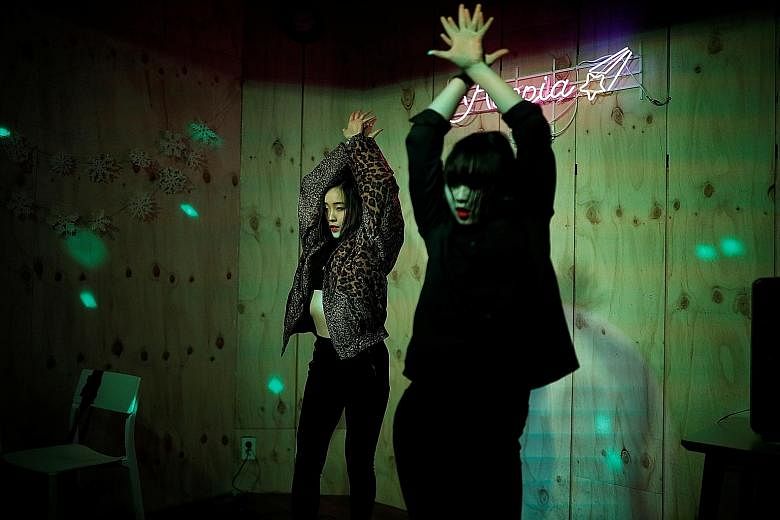SEOUL • Yuuka Hasumi put high-school studies in Japan on hold and flew to South Korea in February to take a stab at K-pop stardom, even if this means long hours of vocal and dance training, no privacy, no boyfriend and even no phone.
The 17-year-old joined Acopia School in Seoul, which offers young Japanese a shot at K-pop fame, teaching dance moves, songs and also language.
She is one of an estimated one million K-pop star wannabes, from South Korea and abroad, hoping to get a shot at auditions by major talent agencies that will take on just a select few as trainees.
"It's tough," Hasumi said, drenched in perspiration from a dance lesson she attended with her pal Yuho Wakamatsu, 15, also from Japan.
Hasumi is one of 500 or so young Japanese who join Acopia each year, paying up to US$3,000 (S$4,080) a month for training and board.
The school fixes auditions with talent management companies that have been the driving force behind K-pop's ascendancy in the world in the past decade, with acts such as BTS and Blackpink.
The influx of Japanese talent that is reshaping the K-pop industry comes at a time of increasingly bitter political acrimony between the two countries.
That the tension has done little to dent the K-pop craze among Japanese youth, and the willingness of South Korean agencies to take on Japanese talent, speak to the strength of the ties between their people, according to one long-time observer.
"They're nuts about BTS over there in Japan," said Mr Lee Soo-chul, board member of Seoul-Tokyo Forum, a private foundation.
K-pop groups and veteran South Korean musicians are selling out concert halls throughout Japan, noted Mr Lee, a former head of Samsung Group's Japanese operations.
Tensions rooted in Japan's 1910-1945 colonisation of Korea have risen amid a perception that Japan's leadership has not adequately atoned for its colonial past.
But the popularity of Korean culture and K-pop music is on the rise in Japan, with many fans and artists saying they are not bothered by the diplomatic chill.
"I might get criticised for being Japanese, but I want to stand on a stage and make (South Koreans) know Japanese can be this cool," said Rikuya Kawasaki, 16, who auditioned unsuccessfully in Tokyo for Acopia School.
For schools and agencies, Japan's music market - the second largest after the United States and bigger than China - is a big prize and many have been on a campaign to recruit Japanese talent.
Some Japanese transplants have already made it big. The three Japanese members of girl band Twice helped make the group the second most popular act in Japan, after BTS.
Their success has prompted JYP Entertainment, the South Korean agency backing Twice, to plan the launch of an idol group comprising only Japanese girls.
Meanwhile, there is no shortage of Japanese hopefuls willing to train under talent agencies' watchful eye, some having left successful careers back home in search of K-pop fame.
Ms Nao Niitsu, 19, a student from Tokyo, said: "I've heard stories about no free time or not being able to do what I want. But I think all K-pop stars who are now performing have gone down the same road."
During a visit to Seoul paid for by her mother, she auditioned for 10 agencies and was accepted by five.
Miyu Takeuchi, 23, said it was not a difficult decision to leave a 10-year career with top idol band AKB48 in Japan to sign with K-pop agency Mystic Entertainment in March.
Even with her experience, she has seven hours of vocal training a day and two-hour dance lessons twice a week, plus early morning Korean lessons. She is not allowed to have a boyfriend, but she has no regrets, despite the fact there is no guarantee she will make it.
"I don't know how long my training period will be, but it has to reach a point where my coaches and management company say: 'Miyu, you are a professional.'"
REUTERS

